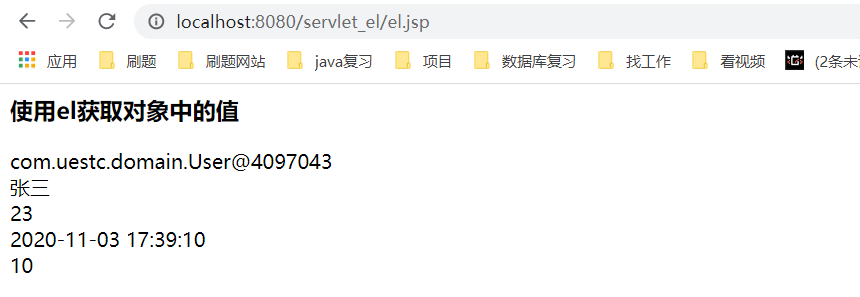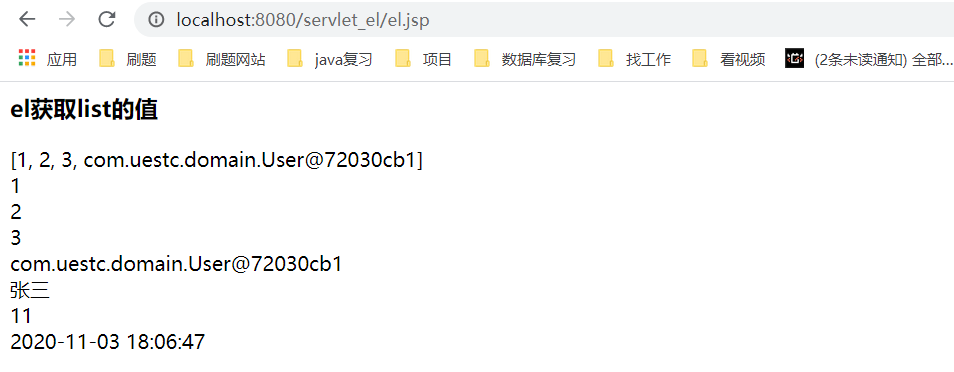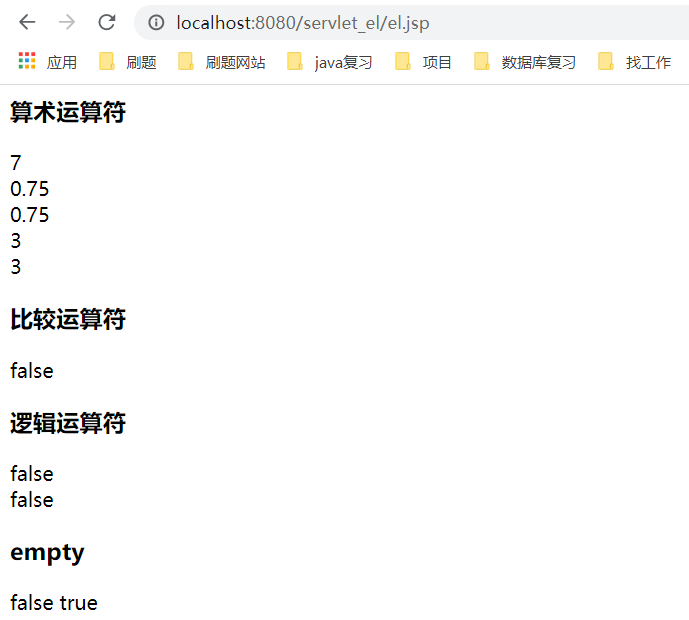EL表达式
概念
Expression Language 表达式语言
作用
替换和简化jsp页面中java代码的编写
语法:
注意:
jsp默认支持el表达式的。如果要忽略el表达式
- 设置jsp中
page指令中:isELIgnored="true" 忽略当前jsp页面中所有的el表达式
\${表达式} :忽略当前这个el表达式
使用:
运算
运算符:
算数运算符: + - * /(div) %(mod)
比较运算符: > < >= <= == !=
逻辑运算符: &&(and) ||(or) !(not)
空运算符:empty
- 功能:用于判断字符串、集合、数组对象是否为
null或者长度是否为0
${empty list}:判断字符串、集合、数组对象是否为null或者长度为0${not empty str}:表示判断字符串、集合、数组对象是否不为null并且 长度>0
示例:
1
2
3
4
5
6
7
8
9
10
11
12
13
14
15
16
17
18
19
20
21
22
23
24
25
26
| <%--
Created by IntelliJ IDEA.
User: Liu Fei
Date: 2020/11/3
Time: 16:19
To change this template use File | Settings | File Templates.
--%>
<%@ page contentType="text/html;charset=UTF-8" language="java" %>
<html>
<head>
<title>Title</title>
</head>
<body>
<h3>算术运算符</h3>
${3+4}<br>
${3/4}<br>
${3 div 4}<br>
${3 % 4}<br>
${3 mod 4}<br>
<h3>比较运算符</h3>
${3==4}<br>
<h3>逻辑运算符</h3>
${3>4 && 3<4}<br>
${3>4 and 3<4}<br>
</body>
</html>
|
效果展示:

获取值
el表达式只能从域对象中获取值
语法
${域名称.键名}
从指定域中获取指定键的值
域名称:
pageScope –> pageContext
requestScope –> request
sessionScope –> session
applicationScope –> application(ServletContext)
示例:在request域中存储了name=张三 ,使用${requestScope.name}进行获取
1
2
3
4
5
6
7
8
9
10
11
12
13
14
15
16
17
18
19
20
21
22
23
| <%--
Created by IntelliJ IDEA.
User: Liu Fei
Date: 2020/11/3
Time: 16:19
To change this template use File | Settings | File Templates.
--%>
<%@ page contentType="text/html;charset=UTF-8" language="java" %>
<html>
<head>
<title>Title</title>
</head>
<body>
<%
request.setAttribute("name","张三");
session.setAttribute("age","23");
%>
<h3>获取值</h3>
${requestScope.name}
${sessionScope.age}
</body>
</html>
|

${键名}
表示依次从最小的域中查找是否有该键对应的值,直到找到为止。
示例:
1
2
3
4
5
6
7
8
9
10
11
12
13
14
15
16
17
18
19
20
21
| <%--
Created by IntelliJ IDEA.
User: Liu Fei
Date: 2020/11/3
Time: 16:19
To change this template use File | Settings | File Templates.
--%>
<%@ page contentType="text/html;charset=UTF-8" language="java" %>
<html>
<head>
<title>Title</title>
</head>
<body>
<%
request.setAttribute("name","张三");
session.setAttribute("name","23");
%>
<h3>获取值</h3>
${name}
</body>
</html>
|

获取对象、List集合、Map集合的值
1.对象:${域名称.键名.属性名}
本质上会去调用对象的getter方法
示例:
创建JavaBean对象
1
2
3
4
5
6
7
8
9
10
11
12
13
14
15
16
17
18
19
20
21
22
23
24
25
26
27
28
29
30
31
32
33
34
35
36
37
38
39
40
41
42
43
44
| package com.uestc.domain;
import java.text.SimpleDateFormat;
import java.util.Date;
public class User {
private String name;
private int age;
private Date birthday;
public String getName() {
return name;
}
public String getBitStr(){
if(birthday!=null){
SimpleDateFormat sdf=new SimpleDateFormat("yyyy-MM-dd HH:mm:ss");
return sdf.format(birthday);
}else{
return "";
}
}
public void setName(String name) {
this.name = name;
}
public int getAge() {
return age;
}
public void setAge(int age) {
this.age = age;
}
public Date getBirthday() {
return birthday;
}
public void setBirthday(Date birthday) {
this.birthday = birthday;
}
}
|
创建el.jsp
1
2
3
4
5
6
7
8
9
10
11
12
13
14
15
16
17
18
19
20
21
22
23
24
25
26
27
28
29
30
31
32
33
34
35
36
| <%--
Created by IntelliJ IDEA.
User: Liu Fei
Date: 2020/11/3
Time: 17:08
To change this template use File | Settings | File Templates.
--%>
<%@ page contentType="text/html;charset=UTF-8" language="java" %>
<%@ page import="com.uestc.domain.User" %>
<%@ page import="java.util.Date" %>
<html>
<head>
<title>Title</title>
</head>
<body>
<%
User user=new User();
user.setName("张三");
user.setAge(23);
user.setBirthday(new Date());
request.setAttribute("user",user);
%>
<h3>使用el获取对象中的值</h3>
${requestScope.user}<br>
<%-- 通过的是对象的属性来获取
setter或getter方法,去掉set或者get,在将剩余部分首字母变为小写
setName --> Name -->name
--%>
${requestScope.user.name}<br>
${requestScope.user.age}<br>
${requestScope.user.bitStr}<br>
${requestScope.user.birthday.month}<br>
</body>
</html>
|
效果展示:

2. List集合:${域名称.键名[索引]}
示例:
1
2
3
4
5
6
7
8
9
10
11
12
13
14
15
16
17
18
19
20
21
22
23
24
25
26
27
28
29
30
31
32
33
34
35
36
37
38
39
40
| <%--
Created by IntelliJ IDEA.
User: Liu Fei
Date: 2020/11/3
Time: 17:08
To change this template use File | Settings | File Templates.
--%>
<%@ page contentType="text/html;charset=UTF-8" language="java" %>
<%@ page import="com.uestc.domain.User" %>
<%@ page import="java.util.Date" %>
<%@ page import="java.util.List" %>
<%@ page import="java.util.ArrayList" %>
<html>
<head>
<title>Title</title>
</head>
<body>
<%
User user=new User();
user.setName("张三");
user.setAge(11);
user.setBirthday(new Date());
List list=new ArrayList();
list.add(1);
list.add(2);
list.add(3);
list.add(user);
request.setAttribute("list",list);
%>
<h3>el获取list的值</h3>
${list}<br>
${list[0]}<br>
${list[1]}<br>
${list[2]}<br>
${list[3]}<br>
${list[3].name}<br>
${list[3].age}<br>
${list[3].bitStr}<br>
</body>
</html>
|
显示效果:

3. Map集合:
${域名称.键名.key名称}${域名称.键名["key名称"]}
1
2
3
4
5
6
7
8
9
10
11
12
13
14
15
16
17
18
19
20
21
22
23
24
25
26
27
28
29
30
31
32
33
34
| <%--
Created by IntelliJ IDEA.
User: Liu Fei
Date: 2020/11/3
Time: 17:08
To change this template use File | Settings | File Templates.
--%>
<%@ page contentType="text/html;charset=UTF-8" language="java" %>
<%@ page import="com.uestc.domain.User" %>
<%@ page import="java.util.*" %>
<html>
<head>
<title>Title</title>
</head>
<body>
<%
User user=new User();
user.setName("张三");
user.setAge(11);
user.setBirthday(new Date());
Map map=new HashMap();
map.put("sname","李四");
map.put("gender","男");
map.put("user",user);
request.setAttribute("map",map);
%>
<h3>el获取map的值</h3>
${map.gender}<br>
${map["gender"]}<br>
${map.sname}<br>
${map["sname"]}<br>
${map.user.name}
</body>
</html>
|
效果展示:

隐式对象
el表达式中有11个隐式对象
pageContext:
获取jsp其他八个内置对象
1
| ${pageContext.request.contextPath}:动态获取虚拟目录JSTL
|







